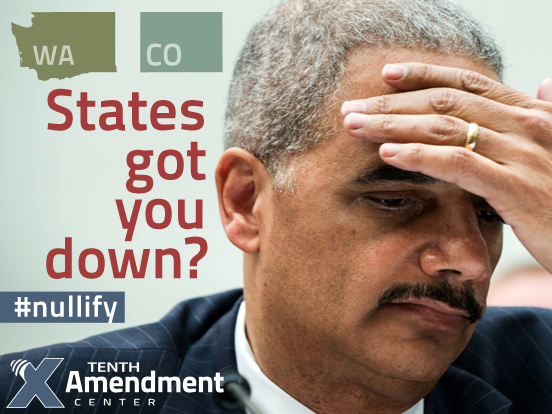James Madison wrote in Federalist 46 that refusing to cooperate with unconstitutional federal acts would create “serious impediments” and “obstructions which the federal government would hardly be willing to encounter.”
On Thursday, Eric Holder’s Department of Justice essentially backed down in the face of marijuana legalization by popular vote in both Colorado and Washington state.
The DOJ said that it would not challenge the new state laws. A DOJ memo indicates that as long as Washington and Colorado create “tightly regulated” markets that address eight federal “enforcement priorities,” it will not interfere with state laws. Federal enforcement priorities include preventing distribution of marijuana to minors, keeping drug money out of the hands of criminal enterprises, preventing diversion of marijuana into states where it remains illegal, preventing trafficking, preventing drug related violence, preventing drugged driving, keeping marijuana cultivation off public lands, and stopping marijuana possession on federal property.
The DOJ couched its announcement in language meant to create the impression that it remains in control, even though it’s not.
In a new memorandum outlining the policy, the Department makes clear that marijuana remains an illegal drug under the Controlled Substances Act and that federal prosecutors will continue to aggressively enforce this statute.
The announcement makes it clear the feds have no will to fight the states on weed. They can call it an “illegal drug” all they want, but if they can’t, or won’t, stop people from using marijuana, their “law” means nothing.
Colorado Gov. John Hickenlooper released a statement Thursday.
Amendment 64 put Colorado in conflict with federal law. Today’s announcement shows the federal government is respecting the will of Colorado voters.
Don’t for a minute think that the feds backed off because Holder and company are soft on weed. The Obama administration has spent more on enforcement measures and conducted more marijuana raids than any president in U.S. history. But when the people of the states resist in big numbers – the feds lose – just like Madison envisioned.
And the people do not support the unconstitutional federal war on marijuana. A Pew Research poll shows 59 percent of Democrats and 57 percent of Republicans think the feds should back off enforcing federal drug laws in states with legalized marijuana. Thursday’s DOJ announcement reveals the power of the people working through their states. It does indeed create “obstructions which the federal government would hardly be willing to encounter.”
In fact, the battle against federal marijuana laws started back in the 90s when California voters approved Proposition 215, or the Compassionate Use Act, legalizing medical marijuana. The Supreme Court ruled that the feds could indeed regulate six plants grown in your back yard in the 2005 Raich v. Gonzalez decision, but that didn’t stop the momentum. Despite sporadic DEA attempts to crush the movement, today, 21 states have ignored the Supreme Court’s opinion and legalized medical marijuana programs.
And now we have the feds essentially telling Washington and Colorado, “you go right ahead and ignore federal ‘law.’ It’s the law! But we won’t enforce it.”
The genie is out of the bottle and she won’t ever go back in. The feds have lost and they know it. No matter how Holder and the DEA couch their words in an attempt to maintain an illusion of control, state actions continue to effectively nullify these unconstitutional marijuana “laws.”
Make no mistake, the entire war on drugs, including marijuana prohibition, rests on the same authority as all of the other undeclared wars waged by the federal government in the last 75 years.
None.
The constitution delegates no authority for the federal government to wage drug war. Drug policy should rightly remain an object left to the states and the people. Doubt this? Then ask yourself why it took a constitutional amendment to enact federal prohibition of alcohol.
In his original draft of the Kentucky Resolutions of 1798, Thomas Jefferson wrote, “Where powers are assumed which have not been delegated, a nullification of the act is the rightful remedy.” Washington and Colorado, along with all of the states now running medical marijuana programs did just that. They exercised their will, ignored the federal mandates and acted with the support of their citizens.
And it’s working.
Nullification Win: DOJ Backs Down on Marijuana Legalization by Tenth Amendment Center
- Writs, Riots, and Redcoats: Hancock’s Spark of the Revolution - January 17, 2026
- The National Bank That Breached the Articles of Confederation - June 2, 2025
- Virginia Association of 1769: A Step Toward Continental Unity - May 12, 2025

